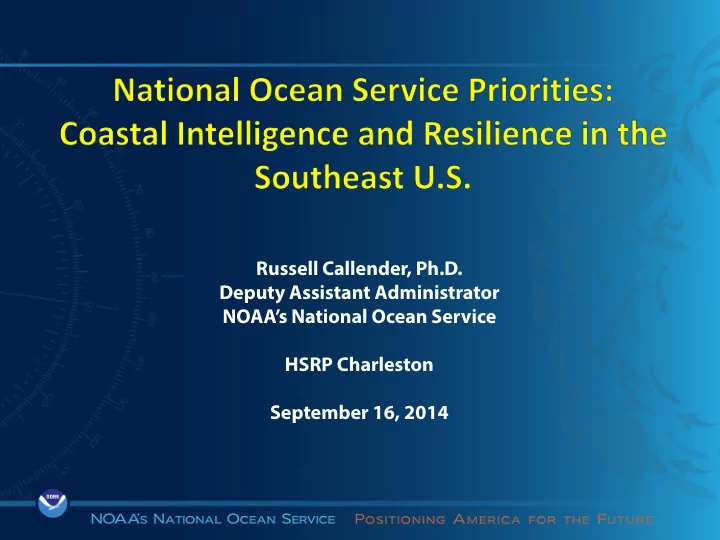

Russell Callender, Ph.D. Deputy Assistant Administrator NOAA’s National Ocean Service HSRP Charleston September 16, 2014
NOS Priorities and Outcomes Coastal Coastal Place-based Resilience Intelligence Conservation Better capacity to Integrated support tools More protection for respond for port communities special places Improved community Regional prediction of Better management for preparedness and total water inundation special places response Natural-based Early warnings for infrastructure utilized in ecological hazards coastal communities 2
Coastal Intelligence 3
NOS Provides Coastal Intelligence National Plan for Civil Earth Observations Released: July 2014 4
Why Does it Matter? 5
Value of Coastal Intelligence Jacksonville PORTS Charleston PORTS 6
Coastal Intelligence → Resilience Before Storm Surge Forecasts After (5 ft. SLR) 7
Future of Coastal Intelligence • Lower costs & more efficiency • Increased accuracy • Capacity for multi-use 8
Future of Coastal Intelligence • Collect once, use many times • Crowdsourcing • Diverse platforms that integrate new and existing technologies 9
Future of Coastal Intelligence • Geographically tailored • Coordination & integration across products • Improve data access, management, and interoperability • Industry opportunities 10
What Can the HSRP Do? • Advise NOAA on strategic issues: – Where’s the science going? – What cutting edge technology should NOAA explore? – What opportunities might exist for new business models (e.g. PORTS)? – Are there opportunities for new partnerships? – What coastal issues should NOAA be tackling? How? • Advise NOAA on regional, national stakeholder needs: – Where are the gaps in NOAA’s products and services? – What stakeholder needs are not being met? – Are there better ways to meet stakeholder needs? – How can NOAA better connect to and strengthen relationships with its stakeholders? 11
Recommend
More recommend